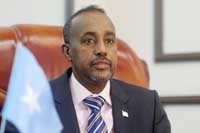
Al Jazeera :
The International Monetary Fund (IMF) could stop its programme in Somalia in three months if long-postponed national elections encounter new delays, a senior official has told the AFP.
The IMF’s programme in Somalia is due for a review in mid-May, but election delays mean that a new administration may not be ready to endorse planned reforms in time, Laura Jaramillo Mayor, the fund’s mission chief for the country, said on Tuesday.
“That review of the IMF supportive programme for Somalia needs to be completed by May 17, if it is not completed by that date the programme automatically terminates,” she told AFP as she began a mission to the Horn of Africa nation.
That in turn would severely affect the impoverished country’s budget and an agreement to reduce its debt from $5.2bn (4.6 billion euros) in 2018 to a target of $557m eventually, Mayor added.
Somalia’s polls are more than a year behind schedule, with voting for the lower house of parliament due to be completed by Friday – a deadline many observers expect the country to miss, with more than 100 seats still pending.
Under the terms of the IMF programme, Somalia’s debt could fall to $557m or about six percent of its estimated gross domestic product as early as “next year”, allowing Mogadishu to attract more funding from international partners and help develop its private sector, Jaramillo said.
One of the poorest countries in the world, Somalia is struggling to recover from decades of civil war and has also been battling an operation waged by armed fighters for years. Nearly 70 percent of its population live on less than $1.90 a day.
Every month, the country’s federal government runs short of $10m to cover crucial expenses such as staff salaries.
But Jaramillo said Somali authorities have worked hard to strengthen government institutions, particularly in terms of tax collection and controlling public spending.
Somalia’s gross domestic product grew by two percent in 2021, according to the IMF, which has been working with the country since 2015.
The expansion was driven by strong household consumption, thanks to remittances from the Somali diaspora, as well as livestock exports, particularly to Gulf nations. Remittances in 2021 amounted to more than $2bn, the equivalent of 28 percent of GDP, according to the IMF, which forecasts growth of 3.2 percent in 2022.

